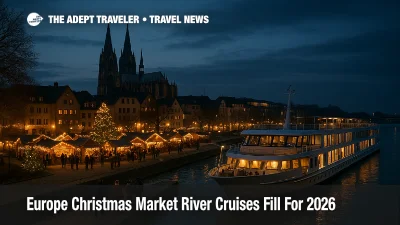Nuremberg, Germany
Nuremberg, Germany, a city that seamlessly blends the rich history with vibrant modernity, is a must-visit destination for anyone looking to travel this year. When you travel to Nuremberg, you'll find yourself stepping into a place where cobblestone streets meet cutting-edge museums and ornate medieval architecture sits harmoniously alongside contemporary art scenes. Situated on the Pegnitz River in the heart of Bavaria, Nuremberg's Old Town is a captivating mix of historical landmarks like the Kaiserburg Castle and the Gothic St. Sebaldus Church, making it an ideal spot for both history buffs and casual travelers alike. Beyond its historically significant sites, Nuremberg, Germany, offers numerous activities from shopping in bustling marketplaces to enjoying traditional Franconian cuisine at cozy, authentic restaurants. Yet, the allure of Nuremberg doesn't end there; the city also hosts several festivals and cultural events throughout the year, such as the world-famous Nuremberg Christmas Market, which transforms the city into a festive wonderland. If you love museums, the Documentation Center Nazi Party Rally Grounds provides an eye-opening, albeit somber, insight into the darker chapters of history, balanced by the playful atmosphere you can experience at Playmobil FunPark or Nuremberg Zoo. With excellent public transportation and a welcoming local population, travel to Nuremberg, Germany, ensures a worry-free, highly rewarding experience. Nature lovers can enjoy the beautiful parks and surrounding countryside, while tech enthusiasts will find fascination in the modern exhibitions at the Museum for Industrial Culture. For anyone looking to add a unique and enriching destination to their travel itinerary, Nuremberg stands out as a city that offers an unforgettable blend of past and present, tradition and innovation.
The History of Nuremberg, Germany
Enshrouded in a rich tapestry of history, Nuremberg, Germany, beckons travelers with its magnificent blend of medieval charm and pivotal historical significance. When you travel to Nuremberg, you are stepping into a city that has been at the heart of historic eras ranging from the Holy Roman Empire to the tumultuous years of the 20th century. This beautiful Bavarian city is more than just a destination; it's a journey through time where each turn reveals layers of stories etched into its architecture, monuments, and cobbled streets.
A Medieval Marvel
The origins of Nuremberg, Germany, trace back to the 11th century, where it quickly rose to prominence as a key trade and craft center. At the heart of Nuremberg's historic appeal lies the Old Town (Altstadt), adorned with half-timbered houses, stone burgher buildings, and impressive fortifications that showcase its medieval past. The Kaiserburg Castle stands as a monumental icon, offering breathtaking views over the city and a glimpse into the lifestyle of past emperors who once dwelled within its walls. Strolling through the Old Town, you’ll encounter the Hauptmarkt, home to the famous Schöner Brunnen (Beautiful Fountain) and the awe-inspiring Gothic church, Frauenkirche, where daily life in the Middle Ages seemingly comes back to life.
The Renaissance and Artistic Flourishes
In the shadow of the castle and the bustling markets, Nuremberg flourished during the Renaissance as a hub of culture and innovation. Celebrated artist Albrecht Dürer, whose house has been converted into a museum, called Nuremberg home. The city's artistic heritage is meticulously preserved and showcased in various museums, including the Germanisches Nationalmuseum, which holds the largest collection of cultural history in the German-speaking world. By choosing to travel to Nuremberg, you immerse yourself in an artistic legacy that encapsulates the transition from medieval austerity to Renaissance enlightenment.
A City of Resilience
Travel to Nuremberg, Germany, and you'll inevitably encounter the indelible marks left by the 20th century. Nuremberg's role as a central stage for the Nazi Party rallies during WWII and subsequently the Nuremberg Trials, which held war criminals accountable, offers profound lessons in history and justice. The Documentation Center Nazi Party Rally Grounds provides deep insights into the rise of the Third Reich, while the Nuremberg Trials Memorial at the Palace of Justice stands as a poignant reminder of the city’s significant place in the advancement of international law and human rights. Yet, despite its turbulent past, Nuremberg exemplifies resilience, having restored its historic heart with meticulous care and respect for its heritage.
When you travel to Nuremberg, Germany, you are not just visiting a destination; you're exploring a living museum where every stone, street, and structure tells a story. With its medieval allure, rich artistic traditions, and profound historical significance, Nuremberg is not only a traveler's paradise but also a timeless testament to human endurance and cultural evolution. Whether you wander through its ancient streets, marvel at its artistic masterpieces, or reflect on its historical lessons, Nuremberg promises a fascinating and enriching travel experience that lingers long after your visit.
The Culture of Nuremberg, Germany
If you're seeking an exhilarating blend of history, culture, and modern dynamism, travel to Nuremberg is a must. Steeped in centuries of rich tradition, Nuremberg, Germany boasts a unique cultural tapestry that caters to everyone. Walking through its cobblestone streets feels like stepping back in time, while its bustling urban spaces remind you that this city intricately balances the old with the new. From its influential past as a key location during the Holy Roman Empire to its poignant role in the 20th century, Nuremberg is a city that has forever shaped history and continues to enrich modern culture.
Experience the Historical Magnificence
One of the most compelling reasons to travel to Nuremberg, Germany is the city’s fascinating historical legacy. The Nuremberg Castle, towering magnificently above the city, casts a medieval charm that takes visitors back to the time of knights and kings. As you wander through its intricately designed halls and courtyards, the architectural prowess on display is nothing short of impressive. The city’s old town (Altstadt), surrounded by ancient walls and fortified gates, is a veritable treasure trove of history that preserves Nuremberg’s medieval character. Not to be missed is the iconic Hauptmarkt, the main market square that hosts the world-renowned Christmas market, a must-see for any traveler.
Immerse Yourself in the Vibrant Culture
Nuremberg's culture is not confined to its historical allure; it pulsates with vibrant, modern energy. Art enthusiasts will relish the city's numerous galleries and museums, such as the Germanisches Nationalmuseum, which houses an extensive collection of German art and cultural history. If your travel to Nuremberg, Germany coincides with the annual Bardentreffen festival, expect to be swept away by an eclectic mix of global music performances that light up the city’s squares and streets. Theatre lovers will find solace in the Staatstheater Nuremberg, which offers an array of compelling performances from classic dramas to modern plays.
Discover the Culinary Delights
Another delightful aspect of travel to Nuremberg is the city’s unique culinary offerings. Renowned for its traditional Bavarian cuisine, Nuremberg, Germany offers a culinary journey that will tantalize your taste buds. Must-try local delicacies include Nuremberg sausages, served with sauerkraut or in a flavorful broth, and the famous Nuremberg gingerbread (Lebkuchen), especially delicious during the holiday season. Pair your meal with a rich Franconian wine or a frothy local beer to experience the full spectrum of Nuremberg’s gastronomic culture. Quaint breweries and traditional beer gardens scatter the city, providing the perfect backdrop for an authentic Bavarian dining experience.
Engage with the Warm, Welcoming People
A trip to Nuremberg would be incomplete without engaging with its warm and welcoming people. Locals, known for their hospitality and spirited approach to life, take pride in sharing their city’s treasures with visitors. Throughout the year, numerous festivals and public events offer ample opportunity to mingle with Nuremberg’s residents, who are always eager to share stories and recommendations. The city's atmosphere is made even more inviting by the animated street markets, open-air cafes, and lively squares where both locals and tourists blend seamlessly, making travel to Nuremberg, Germany a culturally enriching and community-oriented experience.
In essence, Nuremberg offers a unique blend of historical depth, vibrant cultural scenes, mouth-watering cuisine, and heartwarming hospitality. Whether you're a history buff, an art lover, a foodie, or simply someone looking to experience the rich culture of a dynamic German city, travel to Nuremberg promises an unforgettable journey. So pack your bags and get ready to explore all that Nuremberg, Germany has to offer.
The Food of Nuremberg, Germany
Nuremberg, Germany, offers an unparalleled culinary journey that is sure to enchant any traveler. When you travel to Nuremberg, you will be greeted by an array of flavors that meld traditional Bavarian cuisine with innovative gastronomy. Here, culinary experiences range from enjoying street food at charming markets to dining in Michelin-starred restaurants. The city’s vibrant food scene is a compelling reason to travel to Nuremberg, as it encapsulates the essence of German culinary craftsmanship and innovation.
Discover Traditional Bavarian Delicacies
One of the main highlights when you travel to Nuremberg is sampling its traditional Bavarian fare. The Nuremberg Bratwurst, a small, finely-ground sausage seasoned with marjoram, is an iconic dish that has been delighting locals and visitors for centuries. Typically, these sausages are served on a tin plate with freshly baked pretzels and a dollop of mustard. Another must-try is the Lebkuchen, a spiced gingerbread that is especially famous during the Christmas season but can be enjoyed year-round. When you travel to Nuremberg, Germany, savoring these local specialties is an experience that not only satisfies the palate but also connects you with the city's rich culinary heritage.
Explore Fresh, Local Produce at Farmers' Markets
Nuremberg's farmers' markets are a feast for the senses and a perfect destination for those who travel to Nuremberg looking for fresh, local produce. The Wochenmarkt, held at the Hauptmarkt in the city center, is one of the most popular markets offering fresh fruits, vegetables, cheeses, meats, and artisanal breads. Shopping at these markets provides a unique glimpse into the local culture and allows you to interact with the friendly vendors, many of whom are passionate about their craft. Whether you are a seasoned traveler or a first-time visitor to Nuremberg, experiencing the vibrancy of these markets is an exceptional way to immerse yourself in the city's culinary scene.
Dine at Michelin-Starred Restaurants
For those seeking a more upscale dining experience, Nuremberg, Germany, boasts several Michelin-starred restaurants that offer exquisite meals crafted by renowned chefs. Venues such as Essigbrätlein and Waidwerk are renowned for their innovative menus that combine local ingredients with global culinary techniques, resulting in a dining experience that is both sophisticated and unique. Each dish is meticulously prepared and presented, ensuring that your meal is as visually stunning as it is delicious. When you travel to Nuremberg, indulging in a fine dining experience at one of these esteemed establishments is a must for any food connoisseur.
In essence, travel to Nuremberg, Germany, promises a culinary adventure that caters to every taste and preference. From traditional Bavarian specialties to the freshest local produce and exquisite fine dining, Nuremberg's food scene is vibrant and diverse. Travelers who embark on this gastronomic journey will not only enjoy delectable dishes but also gain a deeper appreciation for the city's rich culinary traditions and innovative spirit. So, if you are a food lover looking for your next travel destination, let Nuremberg, Germany, be at the top of your list.
What to See and Do in Nuremberg, Germany
Travel to Nuremberg, Germany, is a journey through time and culture. This historic city, located in the heart of Bavaria, offers an array of attractions that appeal to every type of traveler. Here are ten essential things to do when you travel to Nuremberg, each detailed to provide you with a comprehensive guide for your visit.
Explore Nuremberg Castle
Dominating the city's skyline, Nuremberg Castle is a must-visit. This medieval fortress is steeped in history, serving as a residence for German kings and emperors. Wander through its ancient halls and towers, which offer stunning views over Nuremberg, Germany. The castle complex includes the Imperial Castle, the Imperial Chapel, and various outbuildings, all of which paint a vivid picture of its past grandeur.
Stroll Through the Old Town (Altstadt)
The Old Town of Nuremberg is a beautifully preserved area that transports visitors back to the Middle Ages. Cobblestone streets, half-timbered houses, and historic churches create a picturesque backdrop. Key sights include the Hauptmarkt, where the famous Christkindlesmarkt is held, and the iconic Schöner Brunnen fountain adorned with intricate statues. This part of Nuremberg, Germany, is perfect for leisurely strolls and photography.
Visit Documentation Center Nazi Party Rally Grounds
For a sobering look into more recent history, head to the Documentation Center at the Nazi Party Rally Grounds. The museum offers an in-depth examination of the Nazi era and the Nuremberg Trials. The center is housed in the partially finished Congress Hall, a colossal structure that symbolizes the ambitions of the Nazi regime. Interactive exhibits and extensive documentation provide a comprehensive understanding of this dark chapter in German history.
Admire St. Lorenz Church
One of the most significant religious buildings in Nuremberg, St. Lorenz Church is a masterpiece of Gothic architecture. Its towering twin spires, detailed sculptures, and intricately carved woodwork are awe-inspiring. Inside, you'll find stunning stained-glass windows, the beautiful Sacrament House by Adam Kraft, and an impressive organ. This church is a testament to Nuremberg's rich cultural heritage.
Taste Nuremberg Bratwurst
No travel to Nuremberg is complete without sampling its famous bratwurst. These small, flavorful sausages are traditionally grilled over a beechwood fire and served three in a bun with mustard. Head to one of the many local restaurants or food stalls to experience this culinary delight firsthand. Be sure to pair it with a glass of Franconian beer for a true taste of Nuremberg, Germany.
Marvel at Albrecht Dürer’s House
Art enthusiasts will be thrilled to visit the former home of Albrecht Dürer, one of the most important figures of the Northern Renaissance. The half-timbered house now serves as a museum, showcasing a vast collection of Dürer's works, including his famous engravings and paintings. Interactive displays and historical artifacts offer insight into his life and influence on the art world during his time in Nuremberg, Germany.
Wander Through Nuremberg Zoo
For a family-friendly activity, visit the Nuremberg Zoo, one of the largest and most beautiful zoos in Europe. The zoo is set in a picturesque landscape of rolling hills and woodlands, home to a diverse range of animals from around the world. Highlights include the dolphinarium, where you can watch fascinating dolphin shows, and the polar bear exhibit. The zoo’s naturalistic habitats make it a delightful experience for all ages.
Discover the Germanisches Nationalmuseum
This museum is the largest cultural history museum in the German-speaking world, boasting an extensive collection of art and cultural artifacts. The Germanisches Nationalmuseum features everything from medieval armory and religious art to contemporary pieces. Its comprehensive exhibits provide a deep dive into the cultural history of Nuremberg, Germany, and the broader German-speaking regions.
Relax at Hesperidengärten
The Hesperidengärten, or Hesperides Gardens, are a hidden gem in Nuremberg, Germany. These baroque-style gardens are perfect for a peaceful escape from the bustling city. The meticulously maintained gardens feature beautiful sculptures, fountains, and a variety of plants and flowers. It’s an ideal spot for a leisurely walk, reading a book, or enjoying a quiet picnic.
Experience the Toy Museum
Nuremberg has a long-standing tradition of toy-making, and the Toy Museum celebrates this heritage. The museum’s extensive collection spans several centuries, showcasing toys from different cultures and eras. From antique dolls and model trains to contemporary toys, the exhibits provide a nostalgic journey for visitors of all ages. It’s a unique way to explore another facet of Nuremberg, Germany’s rich history.
Each of these activities offers a unique glimpse into the history, culture, and charm of Nuremberg, Germany. Whether you're a history buff, an art lover, or a culinary enthusiast, your travel to Nuremberg will be filled with enriching experiences.
Why You Should Travel to Nuremberg, Germany
Travel enthusiasts find Nuremberg to be a mesmerizing destination for a plethora of reasons. When you travel to Nuremberg, you'll discover a harmonious blend of medieval charm and modern vitality. The city's old town, or Altstadt, is encircled by ancient walls and is a visual feast of half-timbered houses and cobblestone streets. Travelers often marvel at the impressive Nuremberg Castle, which grants panoramic views of the cityscape. The castle, along with the Gothic architecture of St. Lorenz and St. Sebald churches, provides an immersive historical experience. Your travel to Nuremberg's old town will make you feel as if you've stepped back in time, allowing you to experience history firsthand.
Another reason travelers are drawn to Nuremberg, Germany, is its rich cultural tapestry. The city is famous for its world-class museums and art galleries. When you travel to Nuremberg, an absolute must-see is the Germanisches Nationalmuseum, which houses an extensive collection of art and cultural artifacts. Seasonal events like the Nuremberg International Human Rights Film Festival and the Nuremberg Christmas Market are also key highlights. The latter is particularly famous; hundreds of stalls fill the main square, selling handcrafted gifts, delicious local foods, and festive decorations. Travelers from around the world flock to Nuremberg during the holidays to soak up the cheerful ambiance and partake in the festive traditions.
Why You Must Travel to Nuremberg
There are countless reasons why you must travel to Nuremberg, Germany. For history buffs, the city offers a wealth of historical sites, including significant World War II landmarks like the Documentation Center Nazi Party Rally Grounds and the famous Courtroom 600, where the Nuremberg Trials took place. Foodies will delight in experiencing culinary delights unique to the region, such as the famous Nuremberg sausages and gingerbread. Moreover, the city's efficient public transportation and pedestrian-friendly streets make it easy to explore. The combination of historical richness, cultural vibrancy, and gastronomical wonders ensures that when you travel to Nuremberg, you will create unforgettable memories.
Tips & Tricks for Traveling in Nuremberg, Germany
When planning your travel to Nuremberg, Germany, it's essential to have a few key tips and tricks up your sleeve. This guide offers ten invaluable pieces of advice to enrich and streamline your Nuremberg travel experience. Whether you're visiting historic landmarks, enjoying local cuisine, or navigating public transportation, these tips will help you make the most of your time in Nuremberg, Germany.
1. Book Your Accommodation in Advance
Travel to Nuremberg can be a popular choice, especially during peak tourist seasons and major events like the Nuremberg Christmas Market. Booking your accommodation well in advance ensures you secure a good spot, possibly at better rates. Consider staying in the Old Town (Altstadt) for easy access to the city's key attractions.
2. Optimize Your Itinerary
With so many historical and cultural sites to visit, it's crucial to plan your itinerary strategically. Prioritize must-visit attractions like the Nuremberg Castle, Albrecht Dürer's House, and the Nazi Party Rally Grounds. Allocate time for each location to avoid feeling rushed during your travel to Nuremberg, Germany.
3. Utilize the Nuremberg Card
The Nuremberg Card offers free entry to many attractions and free public transportation for two consecutive days. This is particularly beneficial for travelers looking to explore multiple sites without the hassle of purchasing individual tickets. The card provides excellent value and convenience during your Nuremberg travel.
4. Savor Local Cuisine
No travel to Nuremberg is complete without indulging in local culinary delights. Try the city's famous Nuremberg sausages, lebkuchen (gingerbread), and traditional Franconian beer. Visit local restaurants and beer gardens to get a true taste of Nuremberg, Germany's gastronomy.
5. Learn Basic German Phrases
While many locals in Nuremberg speak English, knowing a few basic German phrases can enhance your travel experience. Simple greetings and polite expressions can go a long way in making connections with residents and navigating your way around Nuremberg, Germany.
6. Use Public Transportation
Nuremberg boasts an efficient public transportation system, including buses, trams, and an underground metro. The Nuremberg Card covers public transport, making it easy and cost-effective to move around the city. Familiarize yourself with the routes and schedules to optimize your travel time in Nuremberg.
7. Explore Off-the-Beaten-Path
While the main tourist attractions are a must-see, exploring lesser-known sites can offer a unique perspective on Nuremberg, Germany. Visit the Lorenzkirche neighborhood for its charming streets and local shops or take a leisurely stroll along the Pegnitz River for picturesque views.
8. Attend Local Events and Festivals
Travel to Nuremberg often coincides with a variety of local events and festivals. The Nuremberg Christmas Market is world-famous, but other events like the Bardentreffen music festival and the Nuremberg International Human Rights Film Festival provide rich cultural experiences. Check event calendars to see what's happening during your visit.
9. Respect Local Customs
Nuremberg, Germany has its own set of customs and traditions. Being aware of local etiquette, such as greeting people with a handshake or being punctual, demonstrates respect and can enhance your interaction with locals. Observing these customs will make your travel to Nuremberg more enjoyable and respectful.
10. Stay Connected
Having access to reliable information and maps is crucial for smooth travel in Nuremberg, Germany. Ensure your phone is equipped with necessary apps, such as translation tools and navigation aids. Many places in Nuremberg offer free Wi-Fi, but having a data plan can be a backup to stay connected.
By incorporating these tips and tricks, your travel to Nuremberg, Germany can be more enjoyable, efficient, and immersive. From planning your itinerary to savoring local flavors, these strategies will help you make the most out of your visit to this historic and vibrant city.
Other Places You Might Like
Travel enthusiasts who have a special fondness for Nuremberg, Germany, will find themselves equally captivated by the charm and historical allure of other European cities. Each destination offers its unique blend of cultural heritage, architectural marvels, and captivating stories that resonate with what travelers admire about Nuremberg. Below are several cities you will love if you appreciate the enchanting atmosphere of Nuremberg.
Rothenburg ob der Tauber, Germany - Situated along Germany’s Romantic Road, Rothenburg ob der Tauber is a picturesque town that mirrors the medieval essence of Nuremberg. Its well-preserved old town, encircled by imposing walls, features half-timbered houses, cobblestone streets, and charming squares that transport you back in time. The town is especially magical during the Christmas season, attracting visitors with its festive atmosphere and the famous Christmas market. For those who travel to Nuremberg, a short excursion to Rothenburg ob der Tauber is an enriching experience.
Prague, Czech Republic - A short drive from Nuremberg, Prague offers a similarly rich tapestry of history and culture. This capital city is home to an impressive medieval Old Town, the iconic Charles Bridge, and the grand Prague Castle. The city's historic center, a UNESCO World Heritage site, exudes an old-world charm reminiscent of Nuremberg. The architectural wonders, including Gothic cathedrals and baroque palaces, make Prague a must-visit for those fascinated by European history and culture.
Bruges, Belgium - Often referred to as the "Venice of the North," Bruges is another city that will appeal to those who love Nuremberg. Its medieval architecture, winding canals, and quaint cobblestone streets create a fairy-tale like ambiance. Key highlights include the Belfry of Bruges, the Basilica of the Holy Blood, and the serene Beguinage. The city's rich history is intertwined with its culinary delights, such as Belgian chocolates and beers, making it a comprehensive sensory experience.
Salzburg, Austria - Nestled against the breathtaking backdrop of the Alps, Salzburg offers a blend of natural beauty and historical intrigue. Famous as the birthplace of Mozart and the setting for "The Sound of Music," the city enchants visitors with its baroque architecture, splendid palaces, and vibrant cultural scene. The Mirabell Palace and Gardens, Hohensalzburg Fortress, and Salzburg Cathedral are just a few of the attractions that draw parallels with the rich cultural landscape of Nuremberg.
Ghent, Belgium - While often overshadowed by its neighbor Bruges, Ghent offers a similarly enchanting experience. Its medieval architecture, majestic castles, and vibrant cultural scene make it a hidden gem worth exploring. Key highlights include the Gravensteen Castle, Saint Bavo's Cathedral, and the picturesque Graslei waterfront. Ghent's unique blend of historical and contemporary attractions provides a fascinating destination for those who enjoy the historical depth of Nuremberg.
Heidelberg, Germany - Located on the banks of the Neckar River, Heidelberg is renowned for its picturesque setting and ancient university. The city's romantic allure is primarily attributed to the Heidelberg Castle, which offers panoramic views of the scenic valley below. The baroque Altstadt, or Old Town, is filled with charming streets, historic buildings, and vibrant squares that captivate the hearts of visitors much like the old town of Nuremberg, Germany.
Vienna, Austria - Vienna's imperial grandeur, cultural richness, and historical significance mirror the captivating experience of traveling to Nuremberg. The Austrian capital is known for its stunning palaces, such as the Schönbrunn Palace and the Hofburg, as well as its exceptional museums and operas. The coffeehouse culture and elegant architecture contribute to the city's sophisticated charm, making it a splendid destination for lovers of European history and art.
Colmar, France - Situated in the Alsace region, Colmar is famous for its well-preserved old town and colorful half-timbered houses. Its picturesque canals and vibrant floral displays create a fairytale setting reminiscent of a storybook. Visitors can explore the fascinating Unterlinden Museum, St. Martin's Church, and the delightful Little Venice area. Colmar’s charm and historical ambiance offer a delightful parallel to the enchanting atmosphere of Nuremberg.
Exploring these cities will provide travelers with diverse yet familiar experiences that echo the medieval magic, rich history, and cultural vibrancy of traveling to Nuremberg, Germany. Each destination offers a unique perspective on European heritage, ensuring an enriching and memorable journey for all who venture to these captivating locations.
Imperial Castle of Nuremberg, Nuremberg, Germany

Europe Christmas Market River Cruises Add 2026, 2027

Berlin Hamburg Rail Works Cut Trains, Add 45 Minutes

Danube Christmas Markets River Cruises Add Evolve 2027
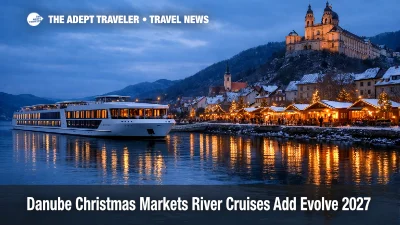
Schengen Internal Border Checks Widespread In Late 2025

Europe Air Traffic Control Delays Worsen, Add Buffers

Eurostar Holiday Cancellations Cut Rail Capacity

New Amsterdam Milan Night Train Opens Alpine Option
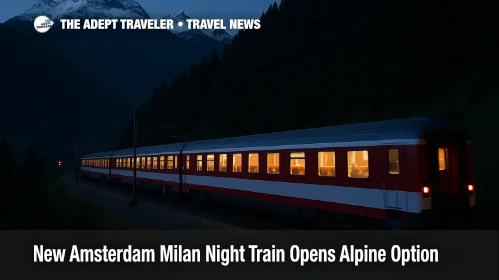
Germany Abu Dhabi Flights Add Daily Routes From May 2026

Berlin Hotel De Rome To Reopen As Four Seasons 2027
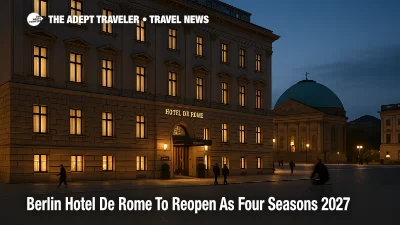
UK Germany Rail Link, London Frankfurt Direct Trains

Europe 2025 Travel Rules Tighten Borders And Costs

New London Luton Flights To Greek Islands May 2026

Snow To Cause Nordic And Alpine Airport Delays

2028 World Cruise From Miami To Athens With Azamara

New Interline Links Frankfurt And Six U.S. Gateways
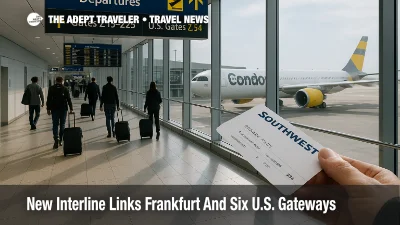
New Melbourne Doha Flights Expand Europe Options

Danube And Rhine Get New Century Star River Cruises
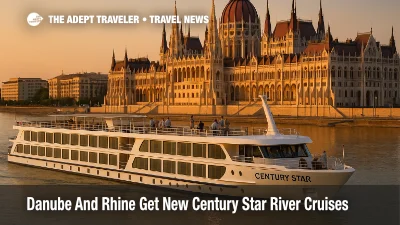
Riverside Europe 2027 River Cruise Bookings Open
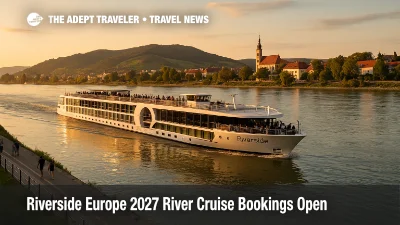
Belgium National Strike Shuts Airports And Trains

New Berlin And Brussels Flights From Canada Summer 2026

December Strikes Hit Europe, New Zealand Flights, Trains

Europe Rail Pass Sale Offers 25 Percent Off Global Passes
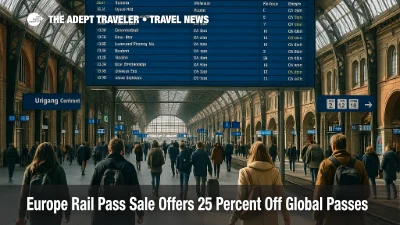
Drone Sightings Shut Eindhoven Airport Flights November 22
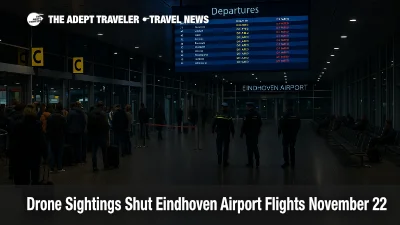
European Airport Delays At Major Hubs November 23-24
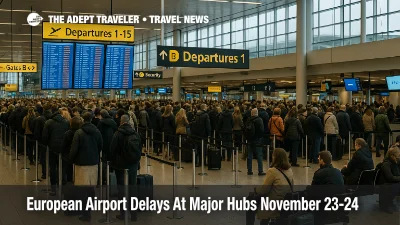
Europe Christmas Market River Cruises Fill For 2026
